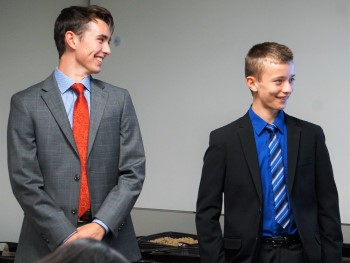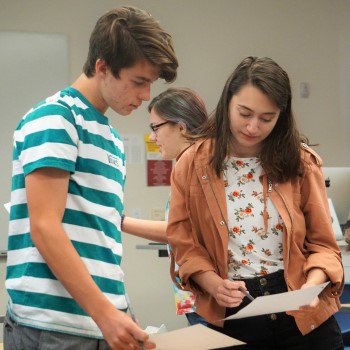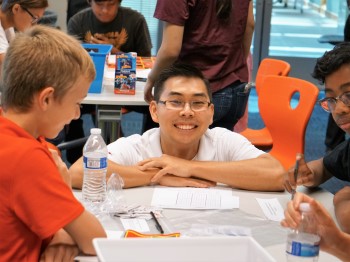How Do I Teach My Students to Be More Accountable?
November 16, 2020
 Accountability is a characteristic that is always emphasized when talking about being a leader or being successful. It is one of the defining characteristics of leadership. Thus, it isn’t a surprise that many teachers and parents are always wondering how they can get their children and students to be more accountable.
Accountability is a characteristic that is always emphasized when talking about being a leader or being successful. It is one of the defining characteristics of leadership. Thus, it isn’t a surprise that many teachers and parents are always wondering how they can get their children and students to be more accountable.
The good news is that there are things you can do to give your students the best possible chance of being more accountable! The bad news is that most teachers and parents try to do this the wrong way and in the end, they usually end up being a detriment to their children and students learning accountability.
The Most Common Mistake in Teaching Accountability
The most common mistake in trying to teach a student to be accountable is telling them to do more instead of doing less.
This was the case in my family for a long time. My parents wanted us to be as accountable as possible. They asked us to do chores, made sure we went to bed earlier and wake up earlier, and created incentives and punishments to get us to improve our grades. They closely monitored our schoolwork and homework. They did a lot for us! But that was the issue—as they did everything, us kids were just following their orders. We weren’t learning any accountability.
Accountability is when a person can take care of themselves and take responsibility for their own life. An accountable person doesn’t need someone to tell them what to do. They don’t need incentives or punishments to motivate them to do beneficial things. Accountability means you have the ability, discipline, and vision to make the right choices and do the right things for your life.
If parents and teachers do too much for students/children, they never learn to be accountable.
The logic is simple: accountability can only be achieved when a person is making their own choices. When you give directions or try to influence someone else, that person can never be fully accountable for their actions—the person telling them what to do is accountable. However, this is very counter-intuitive, compared to the current ideas of parenting and teaching.
Popular opinion says that that good teachers/parents do a lot and bad teachers/parents don’t do anything. This is incorrect, though. Studies have shown that parents of more successful students actually do less and let their children do more (source 2) (source 3).
The Biggest Misunderstanding of Accountability
 The one thing that adults seem to misunderstand about accountability, is that accountability is a skill and it has to be developed. Of course, no child will not be good at it when they are first learning. Thus, when they start trying to be accountable, you can’t expect them to be perfect right away.
The one thing that adults seem to misunderstand about accountability, is that accountability is a skill and it has to be developed. Of course, no child will not be good at it when they are first learning. Thus, when they start trying to be accountable, you can’t expect them to be perfect right away.
To make matters worse, each child begins with a certain level of accountability. This is based upon who they are and their natural capability for this skill. Some children have a talent for math, writing, or sports. Accountability is also a skill and some students are naturally good at it, and others have a low capability in this area. Some children can develop it and become very good at it, and some people might never be really good at it even if they practice. All children can improve at it given the chance, but some might develop quicker than others.
It is tough, but adults must give children room and flexibility to make mistakes when learning to be accountable. Life is about cause and effect—consequence for actions. It is what naturally brings accountability. Every action always has a natural consequence. It is why there are certain actions that will bring greater success. We try to help children to learn certain skills because we have seen these skills correlate to higher success.
If a child wants to stay up late and doesn’t see why it is an issue to stay up late, they will never learn the consequence of it. I know my brothers would have never learned that playing video games 24/7 would not bring them happiness and satisfaction if they weren’t allowed to do it through their junior high careers. But after playing video games for years, they figured out that they didn’t want to do it, and it wasn’t bringing them the consequences they were looking for. So, during their high school careers, they stopped playing video games as much, and they started to study more, pay attention in class, and do things that added more value to the family and the community. It was interesting to watch as my brothers learned how to become more accountable for their own lives. But I know it was painful for my parents to watch.
The Toughest Part About Teaching Accountability
The toughest part about teaching accountability to a child is that the parent or teacher has to provide them with the opportunity to be accountable that meets their current level of accountability. For example, most of the time you won’t let your 1 or 2-year-old child have the accountability to determine if they will walk in the road or on the sidewalk. They usually don’t have the capability to determine that, but they might have the capability to determine which type of vegetable they want to eat. And you might not let your 4-year-old determine their own bedtime, but you might let them decide which toys to play with and what they want to do for their playtime.
This gets more difficult as children get older. You might let some teenagers be accountable to take care of a car and drive themselves places or to keep track of their own appointments. But other teenagers might be dangerous behind the wheel of a car. Thus, the toughest part of teaching accountability is not how much you are going to do for your child, but finding how much you don’t need to do.
This takes knowing your child really well and not having a bias on what their capability is. Many adults say things like, “They should know better” or “They can do better”. Often, when adults say these things, they have a bias and their expectations are too high for their children and students. And since children can be so different in their capability to be accountable, two children might need to be treated in very different ways to help them learn accountability.
5 Things that will Help a Child or Student Learn Accountability
 The optimal way to teach a child accountability is different for each child. But here are five tips that will help you to figure out the best way to teach it to your children or students:
The optimal way to teach a child accountability is different for each child. But here are five tips that will help you to figure out the best way to teach it to your children or students:
1. Accountability can only be learned when you do less
The only way to teach accountability is by letting your children or students be responsible for more. Find one or two things that minimize what you do for your children or students and let them do more. You will know if it works because they will become more accountable. If it doesn’t help them, then find other ways to let them do more. You will eventually find something that they can be more responsible for.
2. Don’t be too hard on your children or students
They will have enough natural consequences in their life, you don’t need to make it worse by punishing them more. If a child or student is put in a situation where they fall too behind or the consequences make their lives miserable, they might stop trying and may not want to do anything. This happens a lot with grades. If a child has to work too hard or they fall behind so much that there is no way for them to catch up or improve their grades, they will give up. It doesn’t help anyone when a child gives up. So, make sure your system, or way of doing things, enables all your children or students to not fall behind by too much, while giving them more responsibility.
3. Talk with your children or students
The best way to figure out what a student or child is willing and capable of doing is talking with them. They are always more willing to go along with a plan, if they are included. If they know that you are truly trying to help them and give them more freedom. They also might come up with some really good solutions or ideas. Children can be very surprising.
4. Give you children or students room to fail
As explained earlier, when your children or students start learning to be more accountable, they probably won’t be very good at it. There are adults who still are not good at it. They will inevitably make many big mistakes and wrong decisions. However, allow them to do that. Do not take away their accountability just because they make a wrong choice. Try to be patient. Yes, I understand if their safety is involved or if the consequences are dire, you might need to get more involved, but let them fail as much as you can tolerate. When they fail, it will allow them to learn quicker and develop a greater ability to be accountable.
5. Be supportive
Although you want to do less, and let your child or student do more, it doesn’t mean that you do nothing. It always helps a student or child to have someone they can turn to for advice or help, but only when they ask or when you observe they are looking for it. It’s good to give them suggestions on things that they can do to help them. Maybe even provide some support every once in a while, when they are really in need. Remember, the goal is to do less, so as long as you are slowly decreasing your support you are heading in the right direction.
About the Author
Read more about Dr. Jacob’s latest book.
Dr. Jacob Kashiwagi is business management consultant and acting Chairman of the Board for Leadership Society of Arizona
Dr. Jacob has worked on 1,100+ industry projects valued at $3.6 billion with a 95% success rate. He has taught over 1,300 college students and 2,500 high school students.

